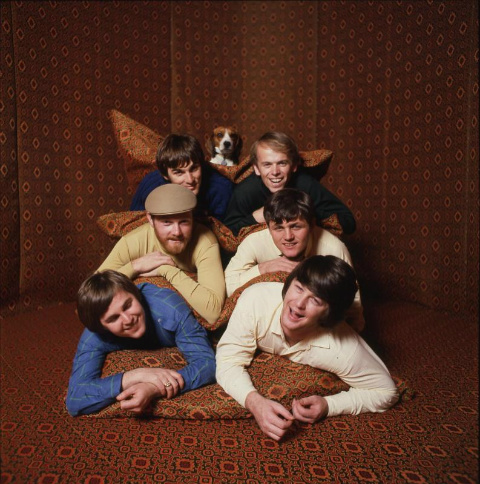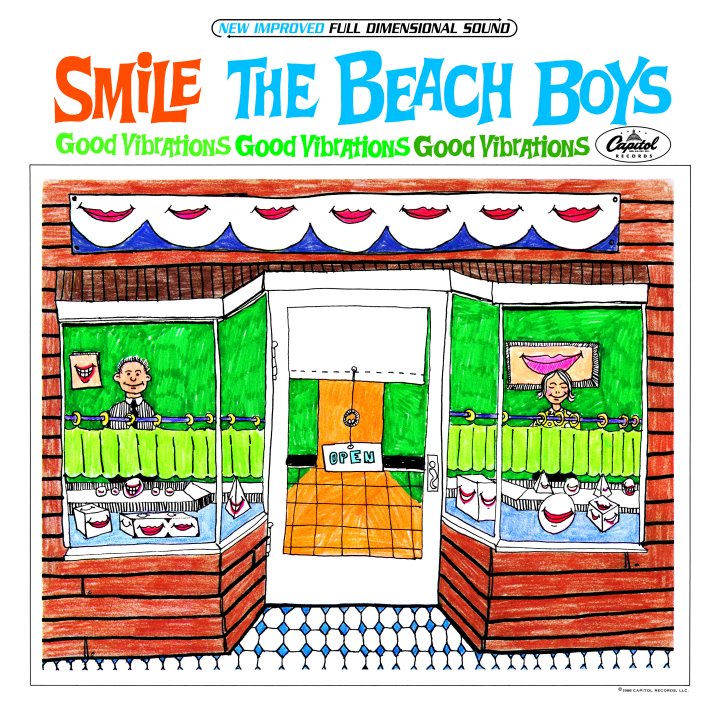Heroes And Villains: The Beach Boys’ SMiLE SESSIONS Reviewed
 I recently wolfed down a delicious $4.99 lunch combo at China First. When I was paying for my meal at the register, I heard a familiar song that I liked. It took me a few seconds to recognize what song it was, but I could tell immediately that it was a song that I knew and loved. One thing that I don’t particularly like to admit is that this song was “Kokomo.”
I recently wolfed down a delicious $4.99 lunch combo at China First. When I was paying for my meal at the register, I heard a familiar song that I liked. It took me a few seconds to recognize what song it was, but I could tell immediately that it was a song that I knew and loved. One thing that I don’t particularly like to admit is that this song was “Kokomo.”
I have no problem admitting that I am a fan of Ace of Base’s hits or Amy Grant’s “Baby Baby.” I do not appreciate them in some kind of ironic way, either. They are good songs with catchy hooks and skilled song craft, and so is “Kokomo,” but I know there’s a difference. I know that I shouldn’t like it. “Kokomo,” written by Mike “Douchebag” Love, Terry “Doris Day’s son” Melcher, Scott “Mamas ‘n’ Papas” McKenzie and “Papa” John “Incest” Philips, is a sax-and-steel drum accented chart topper about some douchey resort in the Florida Keys that Mike Love liked to frequent. The song came from a Tom Cruise movie that I have never seen. Mike Love sang lead. At the request of Disney, Carl Wilson and Al Jardine redubbed vocals that were originally sung by Terry Melcher. The Beach Boy who had no involvement in this #1 single was Brian Wilson.
“Kokomo” is the antithesis of all that is supposed to be holy about “America’s Band.” According to legend, the Beach Boys never released any “good” music before or after Pet Sounds, and they certainly never released any good music without Brian in the driver’s seat. Those who venture into pre-Pet Sounds territory, on the other hand, discover classics like Surfer Girl and The Beach Boys Today! Those who venture into post-Pet Sounds territory discover winners like Holland that Brian had very little to do with. If the Byrds, Pink Floyd, and Depeche Mode can produce smash hits without their key songwriters, why couldn’t the Beach Boys?
As it turns out, with Brian’s two brothers (Carl and Dennis), cousin (Love), and aspiring dentist friend Al Jardine, the Beach Boys could too. Mike Love may have been a tool who wasn’t as talented as Brian, but then again, John Lennon was a tool who wasn’t as talented as Paul. And “Kokomo” is certainly a better song than “Happy Xmas (War Is Over).”

The unreleased SMiLE album is the holy grail for “Kokomo”-hating Beach Boys fans. According to legend, Brian’s brilliant Pet Sounds follow-up, described as a “teenage symphony to God,” would have eclipsed Sgt. Pepper. After the project was canceled, the Beach Boys released the more simplified Smiley Smile in it’s place. Later Beach Boys albums would also include a few cuts from what would have become -the still fragmented- SMiLE. In 2004, Brian finally finished a version of SMiLE with his touring band and released the CD to critical acclaim. But there’s just something about hearing SMiLE in late-60s medium fidelity with Carl singing the crucial middle harmonies.
The SMiLE Sessions, finally released this month by Capitol, includes the closest thing to a finished Beach Boys SMiLE possible without overdubbing anything new. The only problem is . . . the album was not finished, and the unfinished SMiLE, put together from studio scraps, is not as good as either Smiley Smile or the Brian‘s 2004 version.
Sonically, The Smile Sessions is the best that it can be. Although Brian is one of my favorite record producers, there are things about his 60s production style that I do not care for. Brian’s love of lush, stacked arrangements was not compatible with 60s recording technology. Since he had only four, or -later- eight tracks to work with, he bounced four or eight tracks down to one track relentlessly. In those days, each bounce meant a notable loss in fidelity, particularly in the high frequencies. The snare drum in “Heroes And Villains” is a perfect example of what happens to sound with generations of destructive analogue bouncing. For this reason, I find that, in spite of the rapidly improving recording technology, the first production credited to Wilson, 1963’s Surfer Girl, with its more spare arrangements and lack of studio trickery, actually sounds considerably better than the album Brian was working on four years later.
In spite of its moments of beauty and genius, SMiLE was a project as self-indulgent as they come. Brian’s collaborator, Van Dyke Parks (who, incidentally, played accordion on “Kokomo”), known for his own terrible album Song Cycle, does not help. Much of SMiLE is half-baked, over-effected short-attention span music a la A Wizard, A True Star. “Good Vibrations,” successfully fused “modules” recorded in three separate studios together into one song, but even on the similarly constructed hit “Heroes And Villains,” none of the edits on SMiLE are as seamless and well-executed as those. “A musical journey from Plymouth Rock west to Hawaii, complete with a suite devoted to the elements, a song about physical fitness, and a minor key cover of ‘You Are My Sunshine’” doesn’t seem like such a good idea once the pot wears off, or once the rest of the band, who still has to tour while the main songwriter stays home in LA, gets back and listens to it. The Who wisely gave up on Pete Townshend’s similar Lifehouse project, releasing the ubiquitous Who’s Next instead. The Beach Boys did the same with Smiley Smile, a record that I enjoy more than either Who’s Next or SMiLE.
Some of SMiLE’s best tracks, like “Cabin Essence” and “Surf’s Up” did not make it onto Smiley Smile, but that is understandable. Prior to Pet Sounds, the Beach Boys had been releasing three or four records per year. Almost a year had passed since Pet Sounds and the record company wanted a product. If some of the best songs needed more time and energy to develop, or if they would sound out of place on the minimalist home-recorded Smiley Smile, there would always be a future record or two. Some of the other SMiLE songs ended up sounding better on Smiley Smile. “Vegetables,” which is fairly unmemorable in the heavily produced version on SMiLE, is brilliant in its creepy just-bass-and-vocals arrangement on Smiley Smile. “Mrs. O’Leary’s Cow,” which is abrasive and silly on Smile, is beautiful and hypnotic as reinterpreted in Smiley Smile’s stripped-down, slowed-down “Fall Breaks And Back To Winter.” “Our Prayer” and “Cabin Essence” made it onto 1969’s 20/20, and a superior version of “Surf’s Up,” based on the original studio tapes, augmented by Carl “The Man With The Pipes” Wilson’s lead vocal, a Moog, and 70s fidelity, appeared on the 1971 album Surf’s Up, one of the band’s best works.
Anyone who wants to sit through a record that’s good from start to finish will be better served by Smiley Smile, Surf’s Up, the 2004 Smile, or many other albums related to Brian Wilson and the Beach Boys than by The Smile Sessions. But, in some ways, The Smile Sessions does, in fact, deliver the goods. It is nice hearing the familiar songs with Beach Boys harmonies and this version of the album does sound better than the Pro Tools-edited bootlegs that I came across years ago. But the end of the first disc and the entirety of the second disc, while not intended for casual listening, are fascinating for anyone who is interested in hearing how one of the greatest minds in pop music works his magic in the studio. Brian’s “Surf’s Up” demos and instrumental sections of portions of “Heroes And Villains” are audio gold, and not only to fans like me who even bother to own the Party!/Stacks of Tracks two-fer CD.
SIDE NOTE:
The aforementioned Party!, released in 1965, contains twelve mediocre performances of acoustic songs, mostly covers, with corny banter in between and overdubbed “party” noise. On first listen, the album comes across as a total cash-in for the Christmas season and fans who would buy anything. It was precisely that. On the other hand, the passing decades have declared it the precursor to the MTV Unplugged craze, well ahead of its time. Brian’s latest single at the time, “The Little Girl I Once Knew” was a flop. Disc jockeys despised the song because it contained the avant garde sound of silence before the chorus. Party!, on the other hand, generated a #2 hit, the Beach Boys’ famous cover of The Regents’ “Barbara Ann.” As a matter of fact, Party! originally outsold Pet Sounds.
Brian clearly wanted to make big, serious records, but the public wanted to “party!” Still, the modular, ambitious “Good Vibrations” became the band’s second #1 single. The Beach Boys dropped the SMiLE project. In place of the proud “Produced by Brian Wilson” label on its sleeve, Smiley Smile contained the phrase “Produced by The Beach Boys.” Aside from a couple of bizarre and interesting records in the late 70s, America’s band were never Brian’s band again. Twenty-one years passed. Dennis had drowned. The band had tried even its hand at Culture Club-esque synth pop on their Steve Levine-produced eponymous 1985 album. Then, it was 1987. The Beach Boys released their first #1 hit in 21 years. The song was “Kokomo.”
While I disagree with your statement that Smiley Smile is better then SMiLE (The SMiLE Sessions would be my desert island choice out of all the BB cds), you tell a very good story, in a nutshell, very useful for Joe-the-average-people, and I like how it starts and ends with Kokomo.
I believe that, like the Good Vibrations Box from 1993, this box will sell steady and steady after many years, and be highly influential.
Yeah, it’s a good story, but a skewed one. This review is only for music fans who like to be reassured by their music, not challenged. And it’s fine that there are fans like that. What’s not fine is when more challenging music is presented as less than it is, just to differentiate it from the reassuring hit music. A more balanced review would have given credit to the positive aspects of the music, while stating that it merely differs from, (yet is not lesser than) the music which mainstream fans expect from Band X.
When I want to hear some fun tunes, I play early Beach Boys albums. When I want to get swept up in more involved music, I play later Beach Boys albums. I don’t need to put down one to justify liking the other.